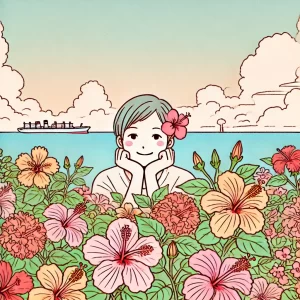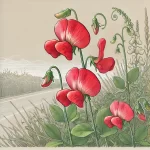花〜すべての人の心に花を〜 [Hana~Subete no Hito no Kokoro ni Hana o~]
喜納昌吉とチャンプルーズ [KINA Shōkichi to Chanpurūzu]
Words & Music : 喜納昌吉 [KINA Shōkichi]
Continuing from the last time, I’ll introduce another representative song by Shōkichi Kina, a musician from Okinawa wiki.
- すべて [subete] : all
- 人(ひと) [hito] : people
- 心(こころ) [kokoro] : heart
- 花(はな) [hana] : flower
The title “すべての人の心に花を / subete no hito no kokoro ni hana o” means “make a flower in everyone’s heart.” This phrase is based on Kina’s experience at the closing ceremony of the 1964 Tokyo Olympics, where athletes from all over the world entered the stadium together, celebrating and mingling, transcending borders and races. He was deeply moved by this festival of peace.

Unlike the bright Okinawan folk style of “Haisai Ojisan,” this song is gentle and soothing. The melody is primarily composed of a major pentatonic scale, giving it a traditional Japanese folk or enka feel.
In the original 1980 version, Shōkichi Kina’s ex-wife, Tomoko Kina, sings the vocals. Her singing utilizes a skill called “kobushi,” a type of melisma used in traditional Japanese folk songs. This style particularly resembles the traditional singing of Okinawa and the southwestern islands.
Additionally, the renowned Ry Cooder wiki plays guitar and other instruments as a guest. Ry Cooder is an exceptional American musician with deep knowledge of roots music and world music, and he has collaborated with many musicians from around the world.
川は流れて どこどこ行くの
kawa wa nagarete doko doko iku no
人も流れて どこどこ行くの
hito mo nagarete doko doko iku no
- 川(かわ) [kawa] : river
- 流れる(ながれる) [nagareru] : flow
- 行く(いく) [iku] : go
- 人(ひと) [hito] : people
(translation) “The river flows away.
People flow away too.”
Here, the word “どこどこ / doko doko” raises some questions. Normally, “どこ / doko” means “where,” but here it seems to be used like an onomatopoeia, perhaps mimicking the sound of flowing water.
そんな流れが つくころには
sonna nagare ga tsuku koro ni wa
花として 花として 咲かせてあげたい
hana toshite hana toshite sakasete agetai
- そんな [sonna] : such
- 流れ(ながれ) [nagare] : flow
- …として [to shite] : as
- 咲く(さく) [saku] : bloom (verb)
- 咲かせる(さかせる) [sakaseru] : make (flowers) bloom
(translation) “When such a flow settles,
I want to let it bloom as a flower, as a flower.”
The word “咲かせる / sakaseru” is sometimes used, and here it refers to making something bloom, not just flowers but other things as well.
The use of “あげる / ageru” here conveys a sense of love, as it carries the meaning of doing something “for you.”
泣きなさい 笑いなさい
naki nasai warai nasai
いつの日か いつの日か 花を咲かそうよ
itsu no hi ka itsu no hi ka hana o sakasō yo
- 泣く [naku] : cry
- 笑う [warau] : laugh
- いつの日か [itsu no hi ka] : someday
(translation) “Cry, laugh,
Someday, someday, let’s make the flowers bloom.”
The phrase “なさい / nasai” is an imperative form of verbs, but it carries a polite and affectionate tone.
The expression “花を咲かせる / hana o sakaseru” can sometimes mean “to succeed” metaphorically, but in this context, it seems to evoke a more peaceful, uplifting image.

涙流れて どこどこ行くの
namida nagarete doko doko iku no
愛も流れて どこどこ行くの
ai mo nagarete doko doko iku no
そんな流れを このうちに
sonna nagare o kono uchi ni
花として 花として むかえてあげたい
hana toshite hana toshite mukaete agetai
- 涙(なみだ) [namida] : tears
- 愛(あい) [ai] : love
- 迎える(むかえる) [mukaeru] : welcome
(translation) “Tears flow away.
Love flows away too.
I want to welcome such a flow as a flower, as a flower.”
泣きなさい 笑いなさい
naki nasai warai nasai
いつの日か いつの日か 花を咲かそうよ
itsu no hi ka itsu no hi ka hana o sakasō yo
花は花として わらいもできる
hana wa hana toshite warai mo dekiru
人は人として 涙も流す
hito wa hito toshite namida mo nagasu
それが自然の うたなのさ
sore ga shizen no uta na no sa
心の中に 心の中に 花を咲かそうよ
kokoro no naka ni kokoro no naka ni hana o sakasō yo
- 涙を流す(なみだをながす) [namida o nagasu] : shed tears
- 自然(しぜん) [shizen] : nature
- 歌(うた) [uta] : song
- 心(こころ) [kokoro] : heart
- 中(なか) [naka] : inside
(translation) “A flower can laugh as a flower.
A person can cry as a person.
That’s the song of nature.
Let’s bloom a flower,
inside the heart, inside the heart.”
泣きなさい 笑いなさい
naki nasai warai nasai
いつの日か いつの日か 花を咲かそうよ
itsu no hi ka itsu no hi ka hana o sakasō yo
泣きなさい 笑いなさい
naki nasai warai nasai
いつの日か いつの日か 花を咲かそうよ
itsu no hi ka itsu no hi ka hana o sakasō yo
いつの日か いつの日か 花を咲かそうよ
itsu no hi ka itsu no hi ka hana o sakasō yo
Throughout the lyrics, there are some parts where the exact meaning might be unclear, but the phrase “泣きなさい / naki nasai” resonates deeply.

This song has been covered by numerous artists not only in Japan but also in over 60 countries, including Taiwan, Thailand, Vietnam, and Argentina.
Shōkichi Kina is not just a musician, but also a peace activist. He continues to send out the message: “A flower in everyone’s heart, turn all weapons into instruments, turn all bases into gardens, and let’s choose festivals over war.”
YouTube Search “Subete no Hito no Kokoro ni Hana o – Shokichi Kina & Champloose”
Thanks for reading! Feel free to comment if you have any feedback or questions.
Follow me on X.



